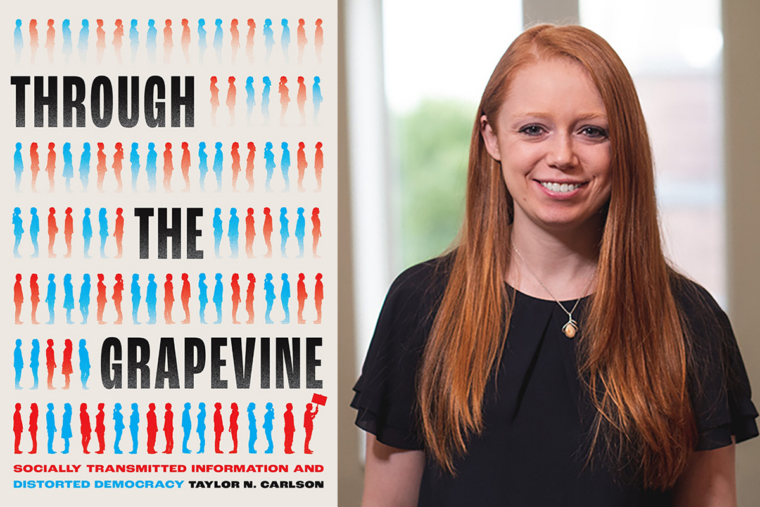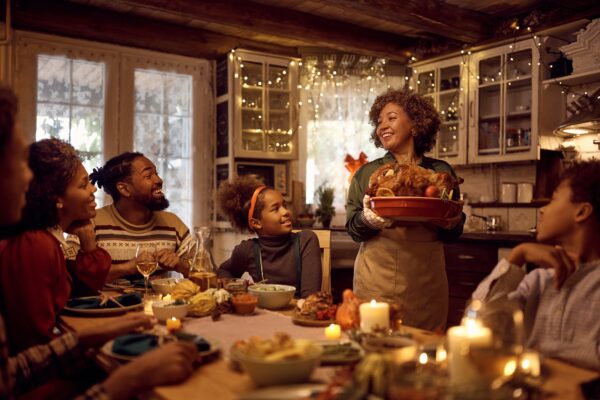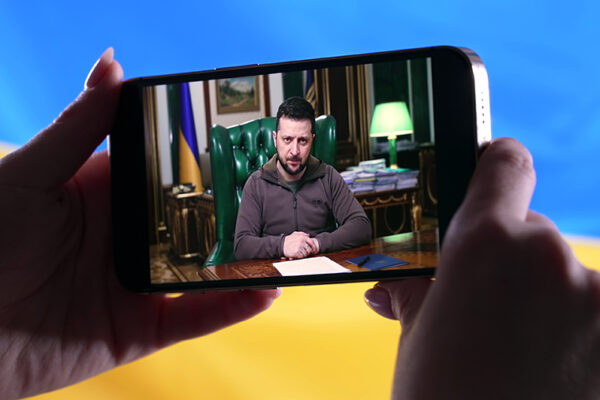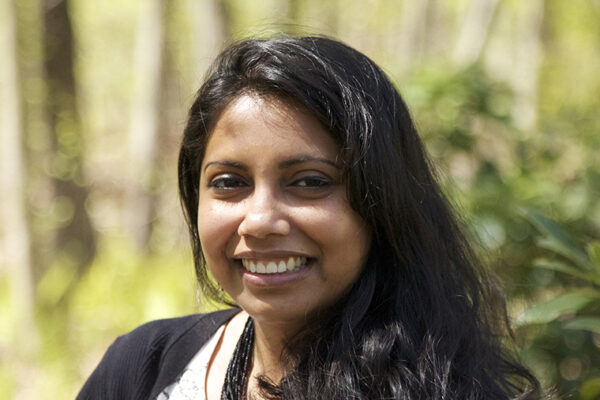Misinformation is a threat to democracy, but who’s to blame? Is it mainstream media, politicians, social media? Or, could there be another culprit — everyday citizens?
In her new book, “Through the Grapevine: Socially Transmitted Information and Distorted Democracy,” published by The University of Chicago Press, Taylor Carlson, an associate professor of political science in Arts & Sciences at Washington University in St. Louis, examines how everyday people — not just the media and politicians — contribute to the creation and spread of misinformation through conversations they have with friends, colleagues and family about politics.
“Accurate information about politics is essential to a functioning democracy,” Carlson said. “For decades, those concerned with the information environment have focused on the mass media, but roughly one-third of Americans do not learn about politics from direct engagement with the news. Instead, they learn about politics from conversations with others and social media.”
As anyone who has ever played a game of telephone knows, messages can easily become distorted as they are passed from person to person. In her book, Carlson explores how political information changes as it flows from the news media to person to person.
Carlson’s research has shown that when people transmit information from the news to each other, the information becomes sparse, biased, less accurate and mobilizing. These changes to the information can sometimes cause people to become less informed and more polarized, but also increasingly engaged in politics.
‘When individuals primarily learn about politics from others instead of the news, they are likely to be exposed to distorted information that can affect their decision-making. Specifically, individuals could learn less, believe more misinformation, develop more polarized policy preferences, but engage more in politics.’
Taylor Carlson
“Learning about politics through the proverbial grapevine fuels distorted democracy. Distorted democracy is marked by an underinformed, polarized but engaged public,” Carlson said.
“This means that when individuals primarily learn about politics from others instead of the news, they are likely to be exposed to distorted information that can affect their decision-making. Specifically, individuals could learn less, believe more misinformation, develop more polarized policy preferences, but engage more in politics.”
It all comes down to trust
Why do people learn about politics from their peers rather than the media? Most scholarship up to this point has assumed that people seek information from friends because it’s a useful shortcut — a timesaver when they do not have the time to read and keep up with the news. But Carlson’s research offers another explanation: trust.
“One of the most interesting and surprising findings that I uncovered in my research was the role trust plays in this equation,” Carlson said.
According to Carlson, research has shown that people who rely on the news for their political information say they trust the news to give them accurate, objective information. But “trust” was also the top reason that people gave for why they rely on word of mouth for political information. They say they can’t trust the media to be accurate and objective, but they can trust their friends.
“This really speaks to how central trust is to shaping where people are learning about what’s going on in the world and how they interpret it,” Carlson said.
“Rebuilding trust in the media is going to be so important to the future of our democracy. But trust is a two-way street — it’s not just the American public being distrustful; the media has also given us reason to be distrustful over time.
“Still, if you don’t trust mainstream media, or even fringe media, how can you trust your friend to be the gatekeeper of your information? Where did your friend get their information? Are they seeking out information that is reliable? Are they injecting their opinions into the information they share? These are all important questions to consider as the person on the receiving end of that information,” she said.
Carlson said it’s important to approach political conversations with friends with the same scrutiny that you would treat information shared through mainstream media and online.
It’s time for a conversation about our political conversations
“Through the Grapevine,” which will be published July 6, is Carlson’s third book in a series that has examined how interpersonal political communication contributes to the state of American politics today. In her last book, “What Goes Without Saying: Navigating Political Discussions in America,” Carlson and co-author Jaime E. Settle focused on understanding political discussion as a social process and unpacked why people engage in political discussion in the first place or choose to avoid it altogether.
A central point of that book was the social considerations, such as preserving social relationships, that drive one’s choices when approaching political conversations. “Through the Grapevine” takes Carlson’s scholarship a step further to examine the political consequences of such discussions.
“If polarization can unfold even without partisan media, then who are we to blame? It is simple to blame ‘the media’ or ‘partisan media’ for the problems in American politics. And the media surely does deserve some credit for contributing to polarization. But the results of this research are provocative because it puts the blame on each other. We, collectively, share some responsibility in contributing to polarization,” Carlson said.
“This is an uncomfortable reality that we must continue to understand if we are to try to change it.”
But before blaming each other for the role we play in facilitating polarization, Carlson challenged people to think harder about whether this is all bad. Throughout the book, she tried to take a balanced approach about whether political conversations are good or bad for democracy.
“While the results here do indeed present substantively and statistically significant results showing that simple socially transmitted information can push attitudes to become more sorted and more extreme, some researchers suggest that polarization can be good for democratic functioning. Polarization can make it easier for voters to identify candidates and parties who support their policy preferences and facilitate political engagement that might actually help democracy function better,” Carlson said.
At the end of the day, Carlson said she hopes her book will spur deeper conversations among scholars and everyday people about the impact that political conversations have on our democracy.



